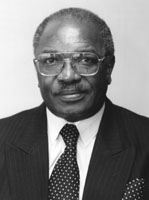|
"You can downsize the Organisation. But if at the end of the day, there is business as usual, then you may not have achieved your purpose."
|
G-77 Chairman singles out poverty and debt as two critical Third World problems
UNITED NATIONS, Feb 14 (G-77/IPS) — The new chairman of the Group of 77 has singled out poverty and debt as two of the critical problems facing developing nations.
“We have to set a time frame— and we have to set a few targets to eradicate poverty. Life is not timeless,” Ambassador Daudi Mwakawago of Tanzania said.
In an interview with the JOURNAL OF THE GROUP OF 77, he said the growing $1.3 trillion Third World debt is hampering development.
 |
Ambassador Daudi N. Mwakawago of Tanzania, Chairman of the Group of 77 |
“In some of the African countries, about 40 percent of all export earnings are being diverted for debt payments,” he said. The debt situation is particularly critical in Africa, he pointed out.
According to the World Bank, there are 41 heavily indebted poor countries and their external debt is $230 billion, about a fifth of all external debt held by developing nations.
The United Nations has warned that Africa’s external debt of over $320 billion and its debt-servicing obligations continue to pose a major threat to economic recovery while the debt overhang is having a negative impact on the availability of resources.
Ambassador Mwakawago said the Group of 77 will place high priority in addressing both the problem of poverty and the problem of debt.
“We have to address the root causes of poverty. The bottom line is the lack of development and maldistribution of resources,” he said.
Asked if a debt write-off is an answer to the problem, he said that it is one of the more sensible and ideal solutions. “But then the world is not run on ideals,” he said.
The G-77 chairman also pointed out the disagreement between creditors and debtors.
The creditors want to tackle the debt problem one country at a time— on a case-by-case basis. But the debtors want to negotiate collectively, he said.
The Group of 77, he assured, will continue to press for the elimination of debt.
Asked about the proposed downsizing or elimination of U.N. bodies dealing with economic and social issues, Ambassador Mwakawago said that institutions such as the U.N. Industrial Development Organisation (UNIDO) and the U.N. Conference on Trade and Development (UNCTAD)— which oversee the interests of developing nations— are fighting for survival.
He pointed out that there also seems to be an emerging pattern to eliminate, downsize or criticize U.N. bodies based in developing countries.
The G-77 chairman specifically singled out the U.N. Environment Programme (UNEP) in Nairobi, the Rwanda Tribunal in Arusha and the U.N. regional commissions based in Addis Ababa, Bangkok, Santiago and Baghdad.
“They have all been under attack. And I would like to be convinced it is not a pattern,” he said.
Asked about the proposed reform of the U.N. system, he said the United Nations is a 50-year old institution and “you cannot run it on a business as usual approach.”
“There are certain things to be addressed. We need to have our priorities right. We have to decide what type of creature we want in the next century,” he said.
“You can downsize the organisation. But if at the end of the day, there is business as usual, then you may not have achieved your purpose,” he said.
Asked about the future of South-South cooperation, Ambassador Mwakawago said that South-South potential has not been fully exploited.
“There is tremendous potential in the South. There are universities and institutions which are churning out graduates and academics. We need to sensitize them,” he said.
These are areas in which the South has invested a lot. Some of the Southern universities, he said, had provided valuable inputs to the South Commission in Geneva.
At the South-South meeting in Costa Rica in January, the G-77 chairman said he met a professor from India who told him: “We are available. Give us work to do.”
One of the shortcomings of the Third World, he said, is that it does not have a full fledged Secretariat unlike the Organisation for Economic Cooperation and Development (OECD) in Paris.
The Group of 77, he said, operates on a shoestring budget and a skelton staff. “I cannot chew more than what I can bite.”
But he pointed out that he had a core of assistants and a core of ambassadors who, like doctors, are always on call.
He said he plans to draw on their expertise and their advise in the larger interests of the Group of 77.
Asked about the financial crisis of the UN, Ambasssador Mwakawago said while the financial health of the Organisation needs addresing, he insisted tha the current malaise was one of payment crisis.
He said that the Organisation owed substantial amounts of cash which powerful members were putting conditions on their legal Charter obligations.
The Ambassador showed concern at this wanton action by those who should support the Organisation and yet were in the forefront to cripple it.
He hoped that wiser counsels will prevail to save the Organisation from total collapse.
Ambassador Mwakawago concluded that the issue of scale of assessments was currently being discussed in the Fifth Committee. The Group of 77 is participating actively in negotiations.
|

